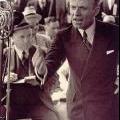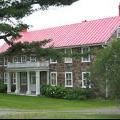 Although not an Eastern Townshipper by birth, Joseph-Adélard Godbout adopted the Townships in midlife, buying in 1930 a century-old farmhouse near Frelighsburg, where he was later buried, and where his family still resides. Born in 1892 in Saint-Éloi, on the Lower Saint Lawrence, Godbout was educated at the Séminaire de Rimouski, the Ecole d'agriculture de Ste-Anne-de-la-Pocatière, and Amherst Agricultural College in Massachusetts. An agronomist by training, he held a post with the Quebec department of Agriculture, and taught agriculture at Ste-Anne until 1930. It was at that time that he bought his property in the Eastern Townships.
Although not an Eastern Townshipper by birth, Joseph-Adélard Godbout adopted the Townships in midlife, buying in 1930 a century-old farmhouse near Frelighsburg, where he was later buried, and where his family still resides. Born in 1892 in Saint-Éloi, on the Lower Saint Lawrence, Godbout was educated at the Séminaire de Rimouski, the Ecole d'agriculture de Ste-Anne-de-la-Pocatière, and Amherst Agricultural College in Massachusetts. An agronomist by training, he held a post with the Quebec department of Agriculture, and taught agriculture at Ste-Anne until 1930. It was at that time that he bought his property in the Eastern Townships.
 Godbout's political career began in 1929, when he was acclaimed to the seat for L'Islet County in the Legislative Assembly of Quebec. Except for a three-year period, he held his seat until 1948. During his first term, Godbout was appointed Minister of Agriculture in the Taschereau government. Amidst the scandals of that regime, he won the respect of his peers and succeeded Taschereau as Premier in 1936. A few months later, he called an election but was defeated by Maurice Duplessis. Backed by the governing federal Liberals, Godbout returned to power in 1939, and was Premier until 1944. His party was again defeated that year by Duplessis, but Godbout stayed on as Opposition Leader until his defeat in 1948. In 1949, he was appointed to the Canadian Senate.
Godbout's political career began in 1929, when he was acclaimed to the seat for L'Islet County in the Legislative Assembly of Quebec. Except for a three-year period, he held his seat until 1948. During his first term, Godbout was appointed Minister of Agriculture in the Taschereau government. Amidst the scandals of that regime, he won the respect of his peers and succeeded Taschereau as Premier in 1936. A few months later, he called an election but was defeated by Maurice Duplessis. Backed by the governing federal Liberals, Godbout returned to power in 1939, and was Premier until 1944. His party was again defeated that year by Duplessis, but Godbout stayed on as Opposition Leader until his defeat in 1948. In 1949, he was appointed to the Canadian Senate.
Adélard Godbout was maligned by his opponents (including the conservative Catholic Church) and later by historians -- this, despite an impressive array of accomplishments while in office, which included, among others: reforms to the educational system (compulsory schooling until age 14; free elementary schooling and textbooks; completion of the Université de Montréal, begun in the 1920s but neglected during the Depression); voting rights for women (Quebec was the last province to grant them); nationalizing several large monopolies that controlled the distribution and pricing of electricity in and around Montreal, thus creating Hydro-Québec, a giant that would expand over time to power the entire the province; and passing a progressive new Labour Code which entrenched the rights of collective bargaining and unionization.
Godbout's downfall was his perceived subservience to the federal government. During World War II, his support for Prime Minister Mackenzie King on the conscription issue, and his acceptance of the new federal unemployment insurance, tarnished his otherwise sterling reputation in the eyes of many Quebec voters.
Joseph-Adélard Godbout died in Montreal in 1956, the result of an accidental fall at his home in the Eastern Townships. He was buried in the parish cemetery in Frelighsburg.